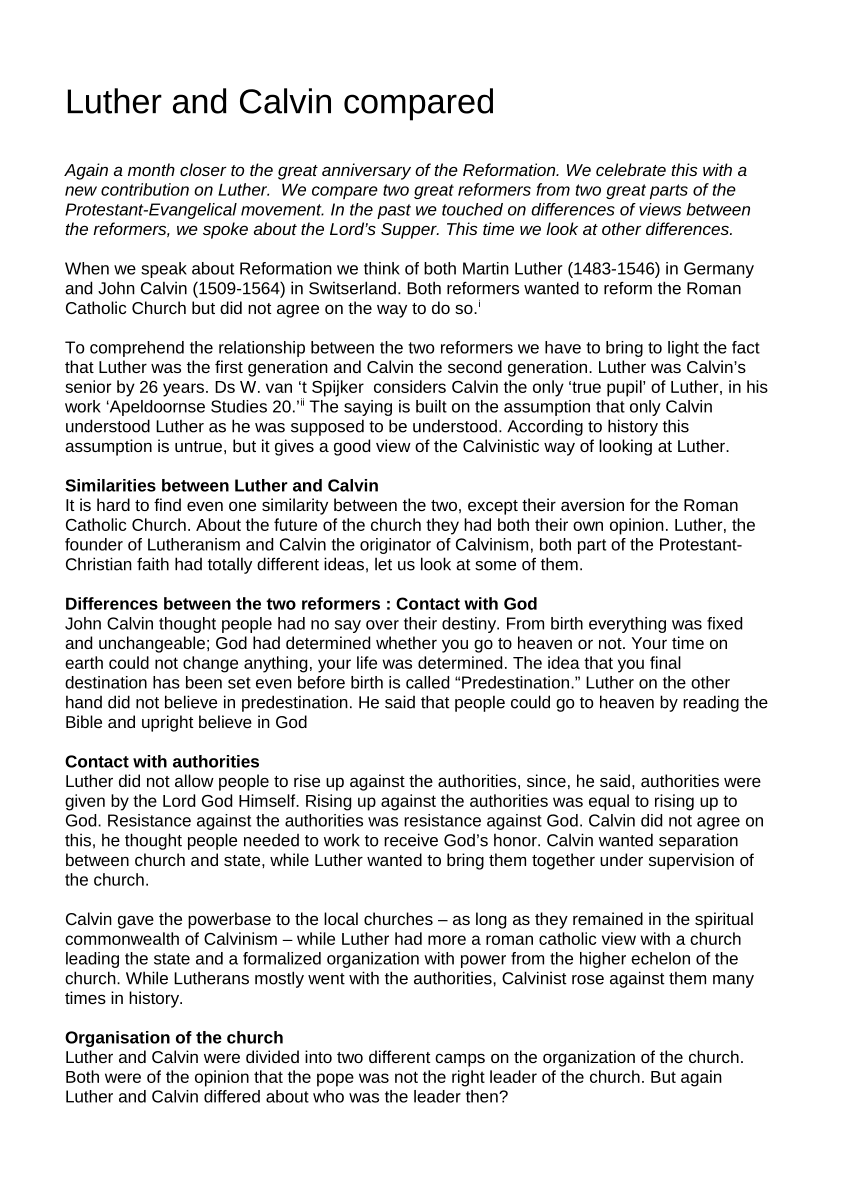The Protestant Reformation was led by two influential theologians: Martin Luther and John Calvin. Luther was a German monk who challenged the Catholic Church’s sale of indulgences, while Calvin was a French theologian who believed in the concept of predestination. Luther was more conservative, saw the Bible as the sole source of religious truth, and emphasized personal experience and individual interpretation of scripture. Calvin believed in divine revelation, a centralized church hierarchy, and strict adherence to God’s laws and doctrines. Despite their differences, both men had a lasting impact on the development of Protestantism and Western culture as a whole.
Martin Luther vs. John Calvin: Comparing Two Leaders of the Protestant Reformation
Introduction
The Protestant Reformation was a major turning point in European history, and it was led by two of the most important figures of the early modern period: Martin Luther and John Calvin. Both men were influential theologians who sought to reform the Catholic Church, which they believed had become corrupt and outdated.
Background
Martin Luther was a German monk who became disillusioned with the Catholic Church after he saw the sale of indulgences, which he believed was a corrupt practice. In 1517, he nailed his famous Ninety-Five Theses to the door of a local church, sparking a movement of dissent and opposition to the Catholic Church. Luther argued that salvation could only be achieved through faith in God, not through good works or the church hierarchy.
John Calvin, on the other hand, was a French theologian who developed his ideas about the reformation while living in Geneva, Switzerland. Calvin’s ideas were more radical than Luther’s, and he believed in the concept of predestination, which held that God had already chosen who would be saved and who would be damned. Calvin’s ideas had a tremendous impact on the development of Protestantism, particularly in the United States.
Key Differences
While both Luther and Calvin sought to reform the Catholic Church, there were key differences in their theological beliefs. Luther was more conservative in his approach and believed in the authority of the Bible as the sole source of religious truth. Calvin, on the other hand, believed in divine revelation and saw the Bible as only one way of understanding God’s will. Luther also believed in the importance of personal experience and individual interpretation of scripture, while Calvin emphasized the need for strict adherence to God’s laws and doctrines.
Another key difference between the two leaders was their views on church governance. Luther’s ideas focused on a more decentralized approach, with local churches and congregations having more autonomy. Calvin, on the other hand, believed in a more centralized structure with a set hierarchy of church leaders.
Influence and Legacy
Despite these differences, both Luther and Calvin had a lasting impact on the development of Protestantism and on European history more broadly. Luther’s ideas helped launch the Protestant Reformation, and his emphasis on individual interpretation of scripture had a significant impact on the development of modern Western culture. Calvin’s ideas about predestination and the importance of following God’s laws continue to shape the beliefs of many conservative Protestant denominations today.
Conclusion
In conclusion, the contrasting theologies and approaches of Martin Luther and John Calvin illustrate the diversity of ideas that emerged during the Protestant Reformation. While both sought to reform the Catholic Church, their distinct beliefs about the nature of God and church governance had a lasting impact on the development of Christianity and Western culture.
